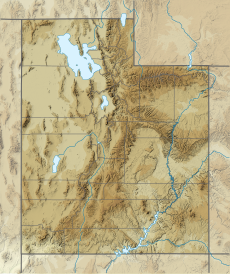Gunsight Butte
| Gunsight Butte | |
|---|---|
 South aspect | |
| Highest point | |
| Elevation | 4,678 ft (1,426 m)[1] |
| Prominence | 1,018 ft (310 m)[1] |
| Parent peak | Romana Mesa[1] |
| Isolation | 2.46 mi (3.96 km)[1] |
| Coordinates | 37°03′41″N 111°20′08″W / 37.0612706°N 111.3354689°W[2] |
| Geography | |
| Location | Glen Canyon National Recreation Area Kane County, Utah, U.S. |
| Parent range | Colorado Plateau |
| Topo map | USGS Gunsight Butte |
| Geology | |
| Rock age | Jurassic |
| Rock type | Entrada Sandstone |
Gunsight Butte is a 4,678-foot-elevation (1,426 m) sandstone summit located in Glen Canyon National Recreation Area, in Kane County of southern Utah.[2] It is situated 12 miles (19 km) northeast of the town of Page. Gunsight Butte is an island that towers nearly 1,000 feet (300 m) above Lake Powell when the lake is full. This iconic landmark of the Lake Powell area is a butte composed primarily of Entrada Sandstone, similar to Padres Butte 3 miles (4.8 km) to the east-southeast, and Dominguez Butte 4 miles (6.4 km) to the southeast. The Entrada Sandstone of Gunsight Butte is overlain by Romana Sandstone, and capped by Morrison Formation.[3] The Entrada Sandstone, which was originally deposited as sandy mud on a tidal flat, is believed to have formed about 160 million years ago during the Jurassic period as a giant sand sea, the largest in Earth's history. According to the Köppen climate classification system, Gunsight Butte is located in an arid climate zone with hot, very dry summers, and chilly winters with very little snow.[4]
See also
[edit]Gallery
[edit]References
[edit]- ^ a b c d "Gunsight Butte - 4,678' UT". listsofjohn.com. Retrieved November 13, 2020.
- ^ a b "Gunsight Butte". Geographic Names Information System. United States Geological Survey, United States Department of the Interior. Retrieved November 13, 2020.
- ^ "T.C. Chidsey, Jr., D.A. Sprinkel, G.C. Willis, P.B. Anderson Lake Powell Geologic Guide, page 63" (PDF). Archived from the original (PDF) on August 14, 2020. Retrieved November 13, 2020.
- ^ Peel, M. C.; Finlayson, B. L.; McMahon, T. A. (2007). "Updated world map of the Köppen−Geiger climate classification". Hydrol. Earth Syst. Sci. 11 (5): 1633. Bibcode:2007HESS...11.1633P. doi:10.5194/hess-11-1633-2007. ISSN 1027-5606.
External links
[edit]- Weather forecast: National Weather Service
- Gunsight Butte prior to Lake Powell: Aerial photo
- Photo of east aspect by Barry Goldwater










